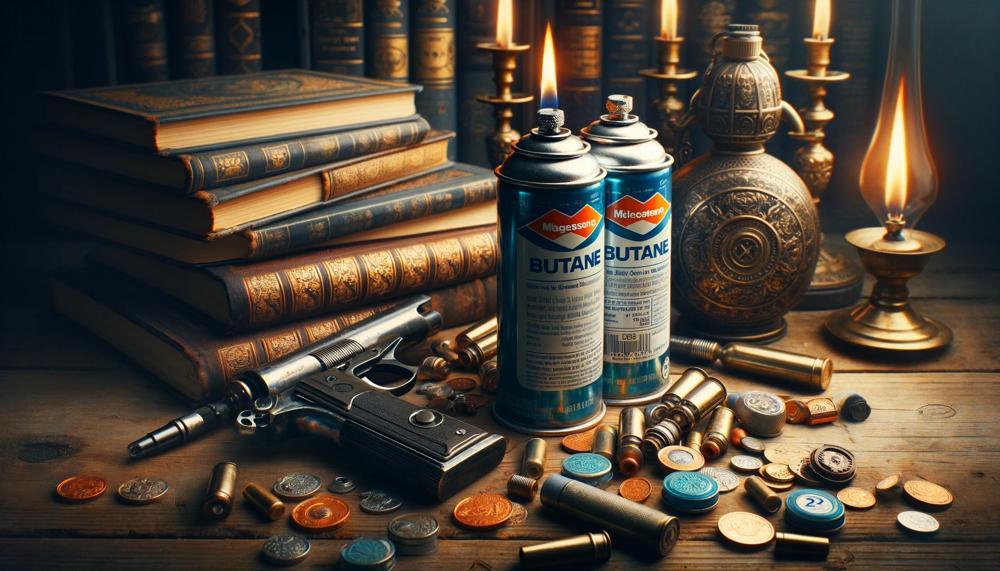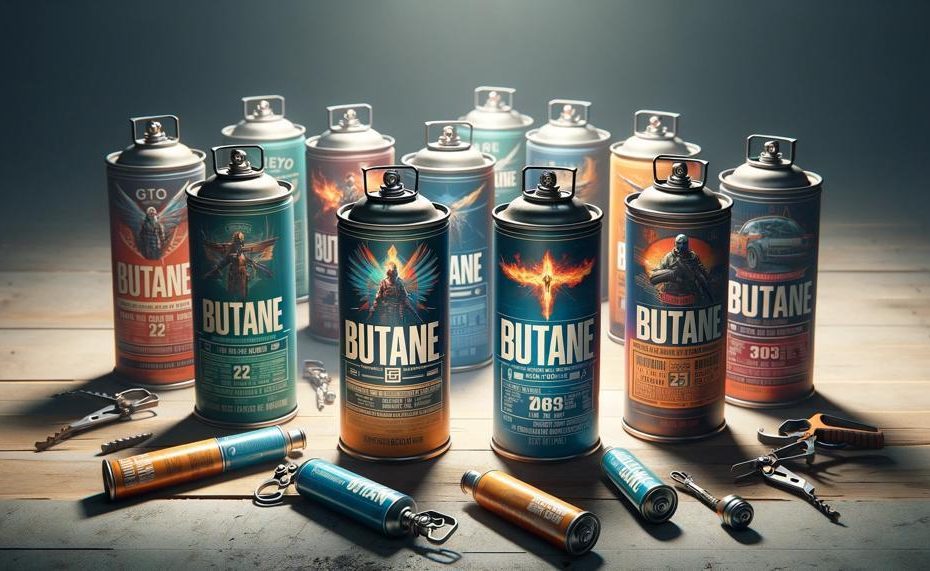Do you consider yourself a culinary connoisseur, whipping up gourmet dishes with the help of a trusty butane torch? Or do you rely on these handy cans for camping trips or DIY projects? No matter your use for them, it’s important to know how to properly dispose of butane cans. You may think they’re harmless, but improper disposal can have serious consequences for both the environment and your safety.
Believe it or not, improperly disposed butane cans can lead to fires and even explosions. In this blog post, we’ll delve into the correct way to dispose of these small but mighty cans.
So, how do you dispose of butane cans?
Butane cans are considered household hazardous waste (HHW) and should be taken to a HHW depot for recycling and disposal.
Here are some steps you can take to dispose of butane cans:
- Light the canister and let it burn until the gas is empty.
- Puncture the sidewall of the canister to remove any remaining gas.
- Take the empty or almost-empty can to a local hazardous waste recycling facility.
- Making gas bottle returns: Many suppliers, retailers, and other companies have schemes in place for returning gas bottles. You can normally take them back to where you originally bought them, or they may offer a collection service.
- Burning out the cartridges: Pick up another stove or small heater that can take those cartridges and just burn them out and toss them in the trash.
- Cutting them in half: If you’re somewhere that doesn’t understand empty punched cylinders, then cut ’em in half on a band saw or with big boy shears.
Some other options for disposing of butane cans include:
Improperly disposing of butane cans can harm the environment and people.
Whether you’re a seasoned pro or new to using butane cans, it’s crucial that we all play our part in keeping our planet and ourselves safe. So keep reading as we guide you through the proper disposal process. Let’s get started.
Contents
- 1 IMPORTANT: Empty The Canister Before Recycling It or Piercing a Hole in It
- 2 Pierce a Hole in the Can To Make It Safe To Recycle
- 3 Can You Recycle or Throw Out Butane Canisters In Your Curbside Collection?
- 4 You Can Crush Butane Cans After Puncturing Them
- 5 Return The Empty Canister To Your Supplier If Possible
- 6 Recycle The Empty Canister With Hazardous Waste
- 7 Conclusion
IMPORTANT: Empty The Canister Before Recycling It or Piercing a Hole in It
It is crucial to empty the canister before recycling it or piercing a hole in it when disposing of butane cans. This ensures that any remaining fuel is removed, making the canister safer to handle and recycle. Proper disposal of butane cans is essential to avoid potential hazards for both humans and the environment.
Additionally, recycling these cans promotes sustainability and reduces waste. Here are some reasons why emptying the canister before recycling it or piercing a hole in it is crucial when disposing of butane cans:
- Safety: Removing any pressure or flammable gas from the canister through emptying ensures that it is safe to handle and recycle.
- Environmental Responsibility: Proper disposal of butane cans helps protect the environment from potential hazards. Recycling these cans reduces waste and promotes sustainability.
- Recyclability: Butane cans are made from highly recyclable materials like stainless steel or aluminum. By emptying and recycling them, we conserve resources and reduce our carbon footprint.
- Following Guidelines: Most municipalities have specific guidelines for disposing of butane cans, including puncturing them before recycling. Adhering to these guidelines ensures proper disposal and avoids fines or penalties.
- Avoiding Contamination: Burning or puncturing butane cans can contaminate the air, water, and soil, causing harm to the environment. Emptying them before disposal prevents this.
- Avoiding Hazards: Using tools like the Crunchit allows for safe piercing of holes in the canisters, making them ready for recycling without any risk of explosion or injury. This also protects waste management workers from potential hazards.
- Proper Storage: Empty butane cans should always be stored safely until they can be properly disposed of to avoid any potential hazards. Emptying them before disposal reduces the risk of accidents or fires during storage.
Emptying the canister before recycling it or piercing a hole in it when disposing of butane cans is crucial for several reasons. Not only does it ensure safety, but it also helps protect the environment and promote sustainability.
Recycling butane cans is important as they are made from highly recyclable materials, and proper disposal can help conserve resources and reduce our carbon footprint. By following guidelines and using tools like the Crunchit, we can safely dispose of these cans without any risk of explosion or injury.
Pierce a Hole in the Can To Make It Safe To Recycle
Puncturing a hole in a can before recycling it is imperative for multiple reasons. Firstly, it guarantees the release of any remaining gas or pressure, making the can safe to handle and eliminating the risk of explosion during the recycling process. Secondly, piercing the can allows for more efficient recycling as it can be easily crushed and stored. This process also helps prevent accidents and injuries during handling and transportation.
Moreover, puncturing a can before recycling is crucial for environmental responsibility. By releasing any remaining gas, it reduces the harmful impact on the environment if the can is not properly disposed of. In addition, properly disposing of butane cans through recycling instead of throwing them in landfills helps conserve natural resources and reduce pollution.
The process of piercing a hole in the can to make it safe for recycling can be effortlessly done with a tool called Crunchit. This tool is specifically designed for puncturing butane cans and releasing any remaining gas in a controlled manner. However, it is essential to handle the cans carefully after use to avoid potential burns.
Proper disposal of butane cans also depends on local regulations. Some cities offer curbside collection for emptied and pierced cans, while others require them to be brought to hazardous waste facilities. It is crucial to check with your local municipality to ensure you are following the correct guidelines.
Can You Recycle or Throw Out Butane Canisters In Your Curbside Collection?
When it comes to discarding butane cans in your curbside collection, there are several factors to consider. Proper disposal is important to avoid potential hazards and protect the environment, especially for canisters used for camping or outdoor activities. Before disposing of these cans, it is crucial to use up or discard any remaining fuel. Once the canister is empty, it is recommended to puncture it using a safe tool like the Crunchit before recycling.
Typically, butane cans are made from recyclable materials such as stainless steel or aluminum, making them eligible for recycling at local hazardous waste facilities or through curbside collection (if allowed by your municipality). However, for safety purposes, it is essential to burn off any leftover fuel before recycling. The Crunchit tool is a popular and effective way to safely puncture the canisters for recycling purposes.
To be certain if empty and punctured butane cans can be recycled through curbside collection in your area, it is best to contact your local municipality for confirmation. If there is still fuel remaining in the canister, it must be disposed of as hazardous waste at designated facilities. Additionally, crushing empty butane cans after puncturing them can save space when storing them.
Some suppliers may offer free recycling services for their gas canisters, so be sure to check with them as well. Furthermore, most cities have dedicated hazardous waste facilities where you can drop off empty butane cans. It is important to properly store these cans in case there are still trace amounts of fuel left in them.
You Can Crush Butane Cans After Puncturing Them
Absolutely. Once you have emptied and punctured the cans, they can be safely recycled either at a hazardous waste facility or through curbside collection depending on your municipality’s policies.
Why Should You Recycle Punctured Butane Cans?

Recycling punctured butane cans is crucial for protecting the environment and avoiding potential harm. These cans contain residual gas that can cause explosions or fires if disposed of improperly.
The materials used in making them can also be harmful to the environment if not disposed of correctly.
Moreover, recycling punctured butane cans helps conserve natural resources by reducing the need for raw materials in manufacturing new products.
How to Properly Dispose of Punctured Butane Cans
Proper disposal of butane cans involves using up all the remaining fuel and puncturing holes in the canister using a safe tool.
To discharge any remaining gas, make sure to puncture the can before recycling or disposing of it. This ensures safety and prevents potential hazards.
Recycling Options for Punctured Butane Cans
Most municipalities have specific guidelines for disposing of hazardous wastes like butane cans. Some cities offer curbside collection for recycling these cans, while others have designated hazardous waste facilities where they can be dropped off.
It is essential to check with your local municipality or waste management service provider for specific guidelines and options for recycling punctured butane cans.
Benefits of Crushing Punctured Butane Cans Before Recycling
Crushing punctured butane cans after puncturing them is an effective way to save storage space. It also makes it easier for recycling facilities to handle and process these cans.
Additionally, crushing the cans ensures they cannot be reused, eliminating potential safety hazards. It also prevents air pockets from forming, which can cause explosions during transportation or processing.
Return The Empty Canister To Your Supplier If Possible
If you have decided to return your empty canister to your supplier, here are some tips to ensure safe and hassle-free disposal:
- Check with Your Supplier: Before returning your empty canister, be sure to check with your supplier if they accept returns. Some suppliers may have specific guidelines or policies in place for returning empty canisters.
- Vent the Canister Properly: To minimize any potential risks, make sure to vent all remaining gas from the canister before returning it. You can do this by lighting the canister and allowing it to burn until all gas has been used up.
- Follow Transportation Guidelines: When transporting the empty canister, be sure to follow all transportation guidelines set by your supplier. This may include using specific packaging or labeling the canister appropriately.
Recycle The Empty Canister With Hazardous Waste
The disposal of empty butane cans that contain hazardous waste is a critical process for several reasons. Not only can these cans be potentially explosive and dangerous if not handled correctly, but their improper disposal can also lead to harm to the environment and potential injuries for waste collectors.
Here, we will explore the importance of safely recycling empty butane cans and the necessary steps to take in doing so.
Ensuring Safety:
The proper disposal of empty butane cans is essential to guaranteeing safety. These cans may still contain trace amounts of fuel, which can be hazardous if not managed correctly.
By recycling the cans, they are safely emptied and punctured, reducing the risk of explosions or injuries.
Preventing Environmental Harm:
Improperly disposing of butane cans in regular trash or recycling can also cause harm to the environment.
These cans may release harmful chemicals into the air and water, polluting our ecosystem. Additionally, when these cans are sent to landfills or incinerators, they take up space and contribute to pollution.
Protecting Waste Collectors:
Improper disposal of empty butane cans also poses a threat to waste collectors who handle these materials.
If a can is not completely empty and punctured, it can explode or cause injury when compressed in garbage trucks or sorting facilities. Properly recycling these cans can prevent potential harm to these workers.
Proper Disposal Methods:
To ensure the safe recycling of empty butane cans that contain hazardous waste, it is crucial to follow specific guidelines.
Check with local authorities for any specific guidelines on how to dispose of these cans in your area. Burning off any remaining fuel and puncturing the canister with a safe tool ensures that it is completely empty and safe to recycle.
Some suppliers may offer free recycling programs for their cans, but it is still important to empty them beforehand. Hazardous waste facilities or drop-off events are also viable options for responsible disposal of empty butane cans.
Storing Empty Butane Cans:
In addition to following proper disposal methods, it is also essential to store empty butane cans safely. This means keeping them in a cool, dry place away from any heat sources or open flames. If there are still trace amounts of fuel left inside, these cans can still pose a risk.
By storing them safely, we can prevent any potential accidents or harm.
Conclusion
In conclusion, it is imperative to dispose of butane cans properly for the sake of our environment and safety. These versatile cans are used for various purposes such as cooking, camping, and DIY projects, making it crucial to know the correct way to recycle or dispose of them. Neglecting proper disposal methods can result in hazardous situations such as fires, explosions, and harm to our planet.
To ensure safe disposal, always empty the canister before recycling or puncturing it with a tool like Crunchit. This not only guarantees safety but also promotes sustainability by conserving resources and reducing pollution. Additionally, following local guidelines and regulations is crucial when disposing of butane cans.
If returning the empty canister to your supplier is not an option, make sure to recycle it at a hazardous waste facility or puncture it before throwing it away. Proper storage of empty butane cans is also essential in preventing potential hazards.
By diligently following these steps and responsibly disposing of butane cans, we can all contribute towards keeping our planet clean and ourselves out of harm’s way.





